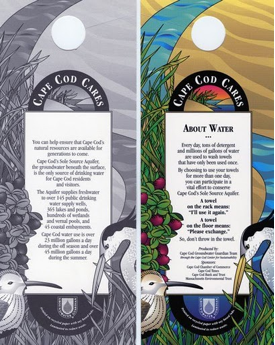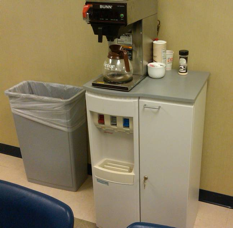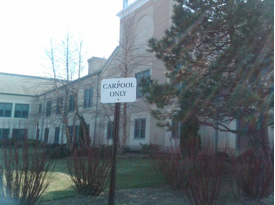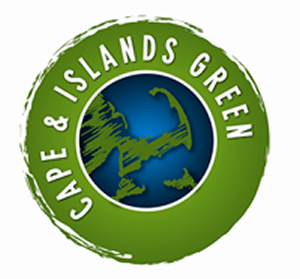Cape & Islands Green Initiative
by Amanda Converse
As Cape Codders, we can't go a day without hearing about the environmental issues that affect Cape Cod: wastewater, nitogen loading, pesticide spraying, and solid waste management.
It is hard to not be overwhelmed by all of the information we hear, and it is even harder to know what we can do as residents and as business owners to address these issues.
The Cape & Islands Green initiative began in 2008 as a joint effort of the Cape Cod Chamber of Commerce, a few local Chambers and members of the business community to help Cape and Islands businesses to do just that – work together to "go green."
Cape & Islands Green aims to educate and encourage people in their places of work, study and worship to engage in best practices that will reduce our collective impact on the natural environment.
In addition, it's been proven again and again that when you use resources efficiently, you reduce operating costs, which in turn increases your business' competetive advantage. You attract employees that are more engaged in your business, as well as show the Cape Cod community that you are a leader.
Promoting environmentally healthy habits amongst employees and patrons inevitably leads to greener actions by individuals in all aspects of living, and will have a ripple effect across the Cape.
Checklist for Going Green
The three-level incentive program provides a checklist for businesses to guide them through the verification process.
The three levels allow businesses to ease into the "going green" process, with Level I asking people to raise their awareness and take small steps to conserve resources. The next two levels ask businesses to simply take their initial efforts further, and to make more of a commitment to environmentally friendly business practices.
The checklist is divided into seven categories:
- Comittment and Awareness
- Solid Waste Minimization
- Energy Conservation
- Water Conservation
- Human Health
- Air and Water Quality, and
- Purchasing, and Transportation.
Each category has a different number of items that are mandatory to acheive in order to become verified.
Examples of checklist items include such things as employee engagement, recycling by-products of doing business, installing a computer knowledge program, using natural lawn and garden care, and cataloguing possible pollutants on the property.
Every Business Can Go Green
Cape & Islands Green was designed for every and any type of business. Home-based businesses, retail stores, hotels, inns, restaurants, hardware stores, ice cream shops, and churches have all gone through the program, and they have all been able to complete the checklist.
Each business must attend a workshop prior to beginning the verification process. The workshop provides technical assistance and guidance on how to complete the checklist in your particular place of business, and in a way that is consistent with your branding.
 |
After verification is determined, the businesses are then able to access the marketing benefits that have been developed by the program as an added incentive for businesses to participate. Benefits include inclusion in the Cape Cod Travel Guide as a green business, listing on the Cape & Islands Green website, as well as mentions on social media by the Cape Cod Chamber.
It is essential for the small businesses that make up Cape Cod's economy to participate and compete in the green economy in order to conserve resources, protect the Cape's natural environment, and gain competitive advantage. However, many businesses do not have the resources to accomplish this on their own.
This was the main reason why Cape & Islands Green was developed, and the reason why over 150 Cape Cod businesses have attended the workshop over the past three years.
For more information on the program and to see a list of verified businesses, visit www.capeandislandsgreen.org. There's also a link to register for upcoming Level 1 workshops, to see about making your business Cape & Islands Green certified.

Amanda Converse received her BA in Environmental Studies from Union College, and her Masters in Environmental Policy from The George Washington University. She has held positions as an environmental consultant, and in various environmental nonprofits.
In July 2008 Amanda and her partner Jitka Borowick created greenover, a green consulting company that helps individuals, businesses and organizations through the process of going "green."
Amanda was also the Development Director for the Hyannis Main Street BID from 2006 to 2010, during which time she worked with many small businesses on their marketing strategies and business models. And in November 2009, Amanda decided to open her own small business, Shift Eco-Boutique, an eco-friendly women's clothing and gift store located in downtown Hyannis.
Amanda has been involved with the Cape & Island's Green program since its inception, and acts as the Program Coordinator, conducting the workshops for participating businesses, as well as providing technical assistance throughout the verification process.
How Cape Cod Businesses
Have Gone Green

Water Use Reminder for Towel Racks encourages hotel guests to reuse their towels

Instead of providing bottled water, the
Cape Cod Five Cents Savings Bank has
filtered water tanks in each of their branches

At Spaulding Rehabilitation Hospital, there is special parking for employees that carpool

